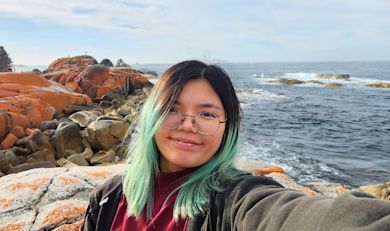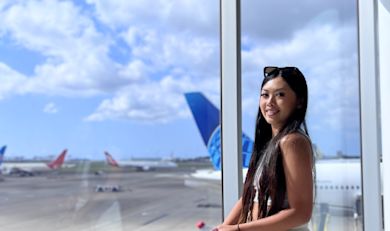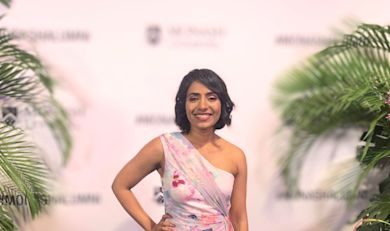- News and articles
- Events
- Find usIDP BahrainIDP BangladeshIDP CambodiaIDP CanadaIDP ChinaIDP EgyptIDP GhanaIDP Hong KongIDP IndiaIDP IndonesiaIDP IranIDP JordanIDP KenyaIDP KoreaIDP KuwaitIDP LebanonIDP MalaysiaIDP MauritiusIDP Middle EastIDP NepalIDP New ZealandIDP NigeriaIDP OmanIDP PakistanIDP PhilippinesIDP Saudi ArabiaIDP SingaporeIDP Sri LankaIDP Taiwan, ChinaIDP ThailandIDP TurkeyIDP UAEIDP VietnamIDP Corporate
- Social
- English
Topics covered
- Published: 11 March 2024
Marine biologists
Marine biologists work with all forms of marine and aquatic life. They understand the anatomy, functions, physiology, behaviour, characteristics and environments of marine life, from fish, to plants, to bacteria, to molluscs. They study and measure animals in their natural surroundings, and their relationships with the world, climate and beings around them.
It's a role that you can make as specialised as you want, pursuing what interests you. Being based in Australia you have access to some of the most diverse marine life in the world; the Great Barrier Reef and the Western Australia coral reefs. Imagine, discovering new corals, helping with the conservation and saving some of the world’s most endangered marine life, or finding a new slime that has amazing medical properties. The oceans are some of the last, most unexplored areas in the world, and you’ll be exploring them.
A day in the life of a marine biologist could include being in the field, collecting samples. Or perhaps, in the lab conducting data analysis. There’s ongoing research and keeping up with latest developments, writing research proposals, and designing studies. Field work is incredibly important, and will include hours of diving and snorkelling.
Over the last five years, numbers of people employed as marine biologists have dropped, and it is a very niche area of employment. You’ll need strong biology, chemistry skills and advanced math knowledge. Having excellent understanding of the scientific method is a must, alongside strong English skills, both verbal and written.
Degrees for marine biology in Australia
This career option is highly skilled, requiring at minimum an undergraduate bachelor degree majoring in marine biology. Most people employed in this field have a post graduate diploma, certificate, or degree too.
The post graduate degree could be:
Master of Marine Science and Management
Master of Science – Marine Biology
Master of Animal Science
Graduate Diploma of Science (Marine Biology)
English requirements for marine biology courses
Every university has different English requirements for marine biology. However, communication is pretty important in this field, and a minimum IELTS score of 6.5 overall and 6.0 in each band would be considered an average requirement.
Current Visa options for marine biologists
Under ANZSCO code 234516, marine biologists are on the short and medium term skills shortage list and are eligible for the following visas:
- This is a permanent visa where you are nominated by an Australian employer. This can allow you to apply for Australian citizenship.
Visa 407 – This training visa is temporary, for up to two years. It allows you to complete workplace based training to improve your marine biology skills. You’ll need a sponsor/ nomination.
– This temporary skill shortage visa in the medium term stream is for up to four years. It’s employer sponsored.
– This permanent visa is for skilled individuals who are nominated and invited to apply. This can allow you to apply for Australian citizenship.
– This temporary graduate visa is a bridging visa which you can utilise if you studied in Australia. This 18-month visa allows you to look for work in Australia.
– This permanent point-tested skilled independent visa requires an invitation in order to apply. This can allow you to apply for Australian citizenship.
– The skilled employer sponsored regional visa is provisional, for up to five years. After three years, you can apply for permanent residency. This visa is employer sponsored, and is only in selected states and regions.
– This temporary skilled work regional visa is for up to five years. The regional sponsor migration scheme visa is designed so that states or territories that have a shortage of marine biologists can find qualified staff.
Assessing authority for marine biologists
If you have an overseas qualification, you will be required to submit to VETASSESS to have your qualifications approved for the role you are applying for within Australia. This ensures your suitability for the role, comparing the skills and education against the Australian Qualifications Framework.
You will be required to submit:
Application fee (at the time of writing, between $880 and $968)
Passport photo
ID proof, as well as any name change information
Evidence of qualification
Evidence of employment, including a statement of service for each role. You need to prove that you have at least one year of highly relevant post-grad employment in the last five years, working more than 20 hours a week.
Any evidence of research, projects, or relevant study
Registration evidence for any governing bodies or licences
Resume / CV
It’s advised that you apply online through the VETASSESS online portal. You can track the application through the process this way too. Notwithstanding shutdowns for public holidays, VETASSESS aims to complete the assessment within ten days.
Marine surveyors
Marine surveyors are a very small part of the job market, and demand for these roles has been consistent and is expected to remain so.
Their job requires them to examine and approve designs of various aspects of boats.
This can include hulls, electrical systems, air conditioning, refrigeration, propulsion engines, auxiliary boilers and turbines, and pumping systems. In depth knowledge in engineering, physics, math, is required, alongside excellent critical thinking skills.
Degrees for marine surveyors in Australia
A VET or university degree is required. The diploma of Maritime Operations (Marine Surveying) is suitable, or a degree in applied science, specialising in marine surveying.
In order to work in this role in Australia post-graduation, registration with two local governing bodies is required. The Australian Maritime Safety Authority, and membership with AIMS, the Australian Institute of Marine Surveyors. This is to ensure you not only remain compliant with laws and regulations, but that constant learning and development occurs.
English requirements for marine surveyors
Each university or VET has differing English requirements. Students will be required to complete a learning, literacy and numeracy assessment before being allowed to start the course.
Current Visa option for marine surveyors
Under ANZSCO code 231215, marine surveyors can apply for the following visa:
Visa 494 - The skilled employer sponsored regional visa is provisional, for up to five years. After three years, you can apply for permanent residency. This visa is employer sponsored and is only in selected states and regions.
Assessing authority for marine surveyors
In order to be able to apply for an Australian visa, you must apply to AMSA, the Australian Maritime Safety Authority, for a certificate of competency. This assessment includes medical and eyesight requirements. There are also minimum hours of time at sea required.
If your qualification was gained from an eligible overseas country, you may be required to apply for a certificate of recognition. In order to do so, you will need to provide:
Evidence of citizenship/ current Australian visa
ID proof
Passport photograph
Your education/ degree
Evidence of sea service
Certificate of competency/ proficiency issued by your home country
Proof of medical fitness, eyesight or oral health.
You lodge a formal application using the Seafarer form 419 by post. There is a fee, which is payable at the post office when you submit the application, or by bank draft or cheque if lodging while overseas. At the time of writing, the fee is between $150 to $200, depending on the capacity you are applying for.
Once this has been processed, you will be required to pass a final oral assessment.
If your qualification is not Australian or from a valid country, you may be required to complete the correct international qualifications.
Marine transportation
Careers in marine transport include roles such as:
Master fishers
Marine engineers
Ship masters
Ship officers
Boating safety officer
Marine safety officer
Vessel traffic officer
These roles will often include activities like driving vehicles such as forklifts and water craft, and operating equipment like hoists. Working with mechanical equipment is a large part of these roles. It can be a physically demanding role.
Employment numbers are dropping slowly but are expected to remain consistent. Skills such as mechanical knowledge, geography, and good judgement are required. Once qualified, registration or licencing is required.
Degrees for marine transport in Australia
There are a number of educational pathways to marine transport roles in Australia.
Certificate II in Fishing Operations
Certificate III in Fishing Operations
Maritime Operations Certificate I, II, III, IV, VI
Bachelor of Applied Science (Nautical Science)
Diploma of Maritime Operations
English requirements for marine transport education
Each learning institution has different standards for English required. An IELTS score of 5.5 with no score less than 5 is generally acceptable.
Current Visa options for marine transport professionals
Under ANZSCO code 231299, the following visa is valid:
494 Visa – The skilled employer sponsored regional visa is provisional, for up to five years. After three years, you can apply for permanent residency. This visa is employer sponsored, and is only in selected states and regions.
Assessing authority for marine transport professionals
As well as applying for the visa of choice, to legally work in Australia as a marine transporter, you will need to be assessed. VETASSESS ensure your qualifications and skills match the requirements of Australian legislation and workplaces. In order to apply, you will be required to submit:
Application fee (at the time of writing, between $880 and $968)
Passport photo
ID proof, as well as any name change information
Evidence of qualification
Evidence of employment, including a statement of service for each role. You need to prove that you have at least one year of highly relevant post-grad employment in the last five years, working more than 20 hours a week.
Any evidence of research, projects, or relevant study
Registration evidence for any governing bodies or licences
Resume / CV
It is likely that you must also apply to AMSA, the Australian Maritime Safety Authority, for a certificate of competency. This assessment includes medical and eyesight requirements. There are also minimum hours of time at sea required.
If your qualification was gained from an eligible overseas country, you may be required to apply for a certificate of recognition. In order to do so, you will need to provide:
Evidence of citizenship/ current Australian visa
ID proof
Passport photograph
Your education/ degree
Evidence of sea service
Certificate of competency/ proficiency issued by your home country
Proof of medical fitness, eyesight or oral health.
You lodge a formal application using the Seafarer form 419 by post. There is a fee, which is payable at the post office when you submit the application, or by bank draft or cheque if lodging while overseas. At the time of writing, the fee is between $150 to $200, depending on the capacity you are applying for.
Once this has been processed, you will be required to pass a final oral assessment.
If your qualification is not Australian or from a valid country, you may be required to complete the correct international qualifications.
Contact IDP to find out more about marine science degrees in Australia
If any marine- based qualifications are what you’re aiming for, contact us at IDP. We can help you find the perfect degree and learning institution, and then guide you through the application and visa process. We want to help you get the degree- and career- you want.
One account for all your study abroad needs
Create your profile and unlock a wide array of features including personalised recommendations, fast-tracked applications and much more.
Search for articles
Dive into our extensive collection of articles by using our comprehensive topic search tool.














